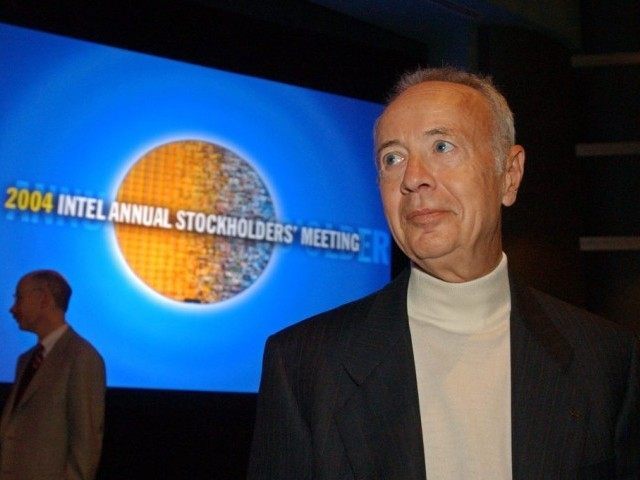Silicon Valley’s Intel Corporation announced that Andrew S. Grove, former Chairman, CEO, and a 1968 company founder, passed away at the age of 79 on March 21.
When chemist Robert Noyce and physicist and co-inventor of the integrated circuit Gordon Moore founded Intel in Santa Clara, chemical engineer Andy Grove was hired as their first employee to be director of operations.
Born to a Jewish family as András Gróf in Budapest, Hungary, Grove immigrated to the United States in 1956, having survived Nazi occupation and escaped Soviet repression. He studied chemical engineering at the City College of New York and then completed his Ph.D. at University of California Berkeley in 1963. After graduation, he was hired by Gordon Moore at Fairchild Semiconductor in San Jose as a researcher and rose in four years to assistant head of Research & Development under Moore.
At the forming of Integrated Electronics, later shortened to “Intel,” the company launched with a revolutionary design of the 3101 Schottky TTL bipolar 64-bit static random-access memory (SRAM), which was almost twice as fast as Schottky diodes from neighboring Fairchild and Japan’s Electrotechnical Laboratory.
Grove was instrumental at Intel in the development of the first commercial metal–oxide–semiconductor field-effect transistor silicon gate SRAM chip in 1970, the first commercially available microprocessor (Intel 4004) in 1971, and one of the first microcomputers in 1972.
Intel grew rapidly, but in the late 1970s the company almost failed due to Japanese competitors, who could manufacture memory chips at much lower costs, and who began dumping large quantities of cut-rate chips on American markets.
With the company facing a crisis, Andy Grove was made president of Intel in 1979. Grove restructured Intel’s manufacturing to deemphasize memory products, and bet the company on the sole-sourced Intel’s 386 microprocessor business partnership with the IBM personal computer.
Rather than laying off employees in the face of foreign competition, Grove ordered Intel staff to work 25 percent overtime for free. He drastically cut manufacturing costs and raised output efficiency. Many Silicon Valley companies imploded during the next four years, but Grove’s strategy succeeded and Intel started beating the Japanese on both performance and price.
Andy Grove published High Output Management in 1982 to describe how he restructured Intel manufacturing, and the strategy America needed to triumph in high tech manufacturing over Asian competitors. The book was subsequently translated into 11 languages and is still offered on Amazon, with a rating of 4.5 stars.
Grove was made CEO in 1987, and then Chairman and CEO in 1997. He relinquished his CEO title in May 1998, after being diagnosed with prostate cancer.
In November 2004, Grove resigned from the board of Intel. But he continued as a company advisor and a lecturer at Stanford University.
In 2010, Grove wrote an important paper for Bloomberg that described why he believed America has a “misplaced faith in the power of startups to create U.S. jobs.” He added, “Startups are a wonderful thing, but they cannot by themselves increase tech employment.” Gove argued that 10 times the number of jobs are created when companies “scale up to build factories, and hire people by the thousands.”
According to Grove, scaling is hard work, but necessary to make innovation matter. As that scaling is pushed off-shore, Grove worried that there would soon be an elite doing the high-value work — and reaping much of the profits — in the U.S, and asked, “[W]hat kind of a society are we going to have if it consists of highly paid people doing high-value-added work—and masses of unemployed?”
More importantly, Grove worried that off-shoring loses what he called the manufacturing “chain of experience that is so important in technological evolution.”
To “rebuild our industrial commons,” Gove advocated that the U.S. “[l]evy an extra tax on the product of offshored labor. (If the result is a trade war, treat it like other wars—fight to win.).” The goal would be “to maintain the industrial base on which we depend and the society whose adaptability—and stability—we may have taken for granted.”
Andy Grove has left Silicon Valley, but his concerns about maintaining domestic tech manufacturing are a key element of the 2016 presidential campaign.

COMMENTS
Please let us know if you're having issues with commenting.